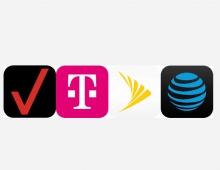
Verizon to Purchase Intel 's Internet TV Project
Intel is selling its failed set-top box project to Verizon. The telecoms company will purchase assets of Intel Media, a division set up to develop "over the top" TV services.
Verizon said the transaction woull accelerate the availability of next-generation video services, both integrated with Verizon FiOS fiber-optic networks and delivered "over the top" to any device.
Terms of the transaction were not disclosed.
Verizon will purchase intellectual property rights and other assets that enable Intel's OnCue Cloud TV platform. Th e company will also make employment offers to substantially all of the approximately 350-person Intel unit, which will continue to be based in Santa Clara and be led by its current management team.
The transaction is expected to close early in the first quarter of 2014.
Lowell McAdam, chairman and CEO of Verizon, said: "The OnCue platform and team will help Verizon bring next-generation video services to audiences who increasingly expect to view content when, where and how they want it. Verizon already has extensive video content relationships, fixed and wireless delivery networks, and customer relationships in both the home and on mobile. This transaction provides us with the capabilities to build a powerful, capitally efficient engine for future growth and innovation. We will have the opportunity to enhance, expand, accelerate and integrate our delivery of video products and services to better serve audiences on a wide array of devices."
Once the transaction is closed, Verizon expects to integrate IP-based TV services with FiOS video to further differentiate FiOS from traditional cable TV offerings and to reduce ongoing deployment costs.
Brian Krzanich, CEO of Intel Corporation, said: "Intel Media's over-the-top TV products are truly innovative and under Verizon's ownership have the potential to change how people interact with content. The critical factor in gaining efficient access to content is based on your ability to scale quickly in subscribers and end users, which is why selling these assets to Verizon makes perfect sense, with its millions of FiOS network and wireless customers. This sale also enables Intel to further align our focus and resources around advancing our broad computing product portfolio in segments ranging from the Internet-of-Things to data centers."
Combined with Verizon's current and recently announced new video-delivery capabilities, the transaction also provides the platform and skill sets for Verizon to continue to expand its video offerings, including mobile, in the future.
High quarter revenue
Verizon also said on Tuesday its quarterly revenue rose 3.4 percent as it added more wireless subscribers than expected at its Verizon Wireless venture with Vodafone Group Plc.
Verizon reported fourth-quarter earnings of $1.76 per share, compared with a loss of $1.48 per share in the year-ago quarter.
Revenue rose to $31.1 billion. Service revenue rose 8 percent to $17.7 billion. The company added 1.7 million net retail wireless connections during the quarter. Of that total, 1.6 million were connections that involved monthly service contracts.
Terms of the transaction were not disclosed.
Verizon will purchase intellectual property rights and other assets that enable Intel's OnCue Cloud TV platform. Th e company will also make employment offers to substantially all of the approximately 350-person Intel unit, which will continue to be based in Santa Clara and be led by its current management team.
The transaction is expected to close early in the first quarter of 2014.
Lowell McAdam, chairman and CEO of Verizon, said: "The OnCue platform and team will help Verizon bring next-generation video services to audiences who increasingly expect to view content when, where and how they want it. Verizon already has extensive video content relationships, fixed and wireless delivery networks, and customer relationships in both the home and on mobile. This transaction provides us with the capabilities to build a powerful, capitally efficient engine for future growth and innovation. We will have the opportunity to enhance, expand, accelerate and integrate our delivery of video products and services to better serve audiences on a wide array of devices."
Once the transaction is closed, Verizon expects to integrate IP-based TV services with FiOS video to further differentiate FiOS from traditional cable TV offerings and to reduce ongoing deployment costs.
Brian Krzanich, CEO of Intel Corporation, said: "Intel Media's over-the-top TV products are truly innovative and under Verizon's ownership have the potential to change how people interact with content. The critical factor in gaining efficient access to content is based on your ability to scale quickly in subscribers and end users, which is why selling these assets to Verizon makes perfect sense, with its millions of FiOS network and wireless customers. This sale also enables Intel to further align our focus and resources around advancing our broad computing product portfolio in segments ranging from the Internet-of-Things to data centers."
Combined with Verizon's current and recently announced new video-delivery capabilities, the transaction also provides the platform and skill sets for Verizon to continue to expand its video offerings, including mobile, in the future.
High quarter revenue
Verizon also said on Tuesday its quarterly revenue rose 3.4 percent as it added more wireless subscribers than expected at its Verizon Wireless venture with Vodafone Group Plc.
Verizon reported fourth-quarter earnings of $1.76 per share, compared with a loss of $1.48 per share in the year-ago quarter.
Revenue rose to $31.1 billion. Service revenue rose 8 percent to $17.7 billion. The company added 1.7 million net retail wireless connections during the quarter. Of that total, 1.6 million were connections that involved monthly service contracts.





















